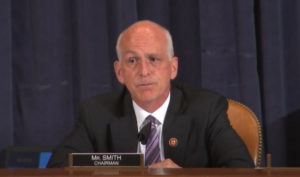The leader of the House Armed Services Committee said Wednesday he expects a compromised version of the next defense policy bill to be finalized by the end of week, with a goal to pass the legislation in the first week of December.
“We’re making good progress and are confident that we’ll get it done,” Rep. Adam Smith (D-Wash.), the HASC chairman, said during a discussion on C-SPAN’s Washington Journal,
where he provided an update on the timeline for the fiscal year 2023 National Defense Authorization Act (NDAA).

Smith on Wednesday also criticized remarks from Rep. Kevin McCarthy (R-Calif.), the House minority leader, calling for final NDAA consideration to be delayed until next year when Republicans will have control of the lower chamber.
“Let’s do our job. And we need to do it, and not keep kicking it off. And if you kick it off for four, five, six months, you are really damaging the United States military. So I hope Kevin McCarthy understands that. He claims to care about national defense. You are damaging the United States military every day past October 1 that you don’t get it done and, certainly, more so every day past January 1,” Smith said during a discussion at the Politico Defense Summit.
Republicans are set to control the House in the next Congress with a slim majority, where Smith will move over to HASC’s ranking member role and Rep. Mike Rogers (R-Ala.), the panel’s top Republican, will take over as chairman.
Smith noted that consideration of the final version of the NDAA is “already a month and a half late,” and reiterated his view that the bill will pass before the end of the year with bipartisan support.
“We’re going to get [the NDAA] done this year, because that’s the right thing to do. And, also, this is a really good bipartisan, bicameral bill,” Smith said. “Whether it’s this year or next year, this bill will not pass along party lines. It will not pass with just Republican votes. It will not pass with just Democratic votes. It has to be bipartisan.”
The Senate Armed Services Committee advanced its $847 billion version of the NDAA out of committee in mid-June, after adopting a $45 billion topline increase during its closed-door markup of the bill (Defense Daily, June 16).
The House in mid-July voted 329 to 101 to pass its nearly $840 billion version of the NDAA (Defense Daily, July 15).